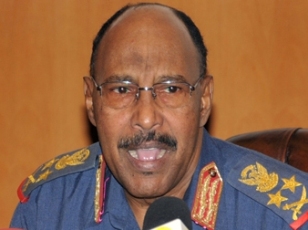Sudan’s defense minister says Khalil Ibrahim killed in intel-based airstrike
December 27, 2011 (KHARTOUM) – The Sudanese Defense Minister Abdul Rahim Mohamed Hussien revealed on Tuesday that Darfur rebel leader, Khalil Ibrahim, was killed in an air excursion made possible by the tracking of a phone call.

When it reported Khalil’s death on Saturday, SAF said that he died after succumbing to an injury sustained two days earlier during clashes between his forces and the army in north Kordofan.
On the other hand, JEM disputed the army’s account and reported that its leader was killed instantly while sleeping as a result of a sophisticated airstrike indicating the involvement of foreign countries with greater capabilities that those known to Sudanese forces.
Hussein, who was addressing the parliament, said that the tracking of a phone call had enabled the army to pinpoint the location of Khalil and strike him.
The Sudanese minister went on to boast the killing of Khalil as the climax of a great intelligence operation which, according to him, began since the rebel leader fled Libya.
Khalil’s death came after less than five months since he returned in September to Darfur from Libya where he was exiled for more than a year.
Hussien told parliamentarians that killing Khalil was tantamount to beheading the rebellion in Darfur. He added that his group had been decimated after the army managed to destroy 45 percent of its 200-strong fleet of armed vehicles.
The defense chief said that some JEM forces were on their way to join the forces of Abdul Aziz al-Hilu, the leader of the Sudan People’s Liberation Movement-North’s (SPLM-N) rebellion, near al-Ubayid area in Southern Kordofan. Hussien vowed to destroy these forces before they reach their destination.
JEM forged an alliance in late November with two rebel factions from Darfur and the SPLM-N which is fighting the government in South Kordofan and Blue Nile on the borders with South Sudan.
The goal of the alliance, dubbed the Sudanese Revolutionary Forces, is to topple the Khartoum government through military means.
Meanwhile, the Sudanese intelligence chief reported before the parliament that the army’s warplanes shelled Khalil’s convoy from a height of 120-150 km, something he regarded as a testimony to the advanced capacity of the country’s air forces.
In a related context, press reports in Khartoum said that the defense minister conveyed to the parliament in a secret session on Monday his concern about the repercussions of the visit of South Sudan’s president Salva Kiir to Israel.
South Sudan’s president Kiir last week visited Israel for the first time since his country seceded from Sudan in July and met with top officials including president Shimon Peres, Prime Minister Benjamin Netanyahu, Defense minister Ehud Barak and foreign minister Avigdor Lieberman.
Sudan, which has no diplomatic relations with the Jewish state, expressed alarm over the visit, saying it poses a threat to Khartoum’s national security.
In the session, the minister reportedly accused South Sudan’s ruling party, Sudan People’s Liberation Movement (SPLM), of planning to wage war against Sudan on multiple fronts including the Blue Nile, Raja, South Darfur and Kauda.
The Sudanese parliament on Monday branded South Sudan as the biggest security threat to the country, citing Juba’s alleged support to its erstwhile allies in South Kordofan and Blue Nile as well as Darfur rebel groups.
(ST)
